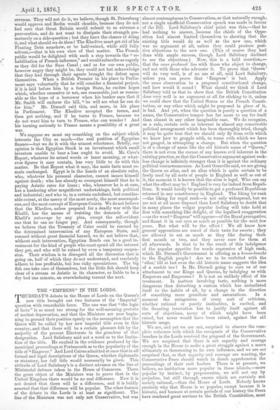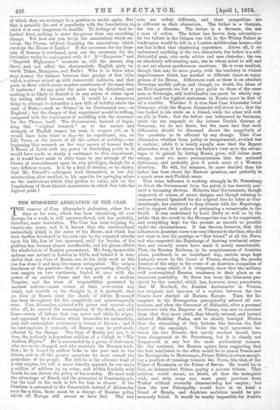THE "EMPRESS" IN THE LORDS.
HURSDAY'S debate in the House of Lerds on the Queen's new title brought out two features of the 'Imperial' question with remarkable force. The one was that "the logic of facts" is as usual too strong for the well-meaning protests of modest deprecation, and that the Ministers are now begin- ning to ground their position openly on the assumption that the Queen will be called by her new imperial title even in this country, and that there will be a certain pleasure felt by the majority of the present Electorate in the grandeur of that designation. Lord Salisbury said not a word as to the limita- tion of the title. He exulted in the evidence produced by the municipal proceedings at Portsmouth as to the popularity of the title of "Emperor." And Lord Cairns admitted at once that in all formal and legal descriptions of the Queen, whether diplomatic or statutory, her full title would necessarily be given. This attitude of Lord Salisbury's is a distinct advance on the line of Ministerial defence taken in the House of Commons. There the great object of the Ministers was to prove that in the United Kingdom there would be no real difference. Now it is not denied that there will be a difference, and it is boldly asserted that that difference will be popular. The other feature of the debate in the Lords is at least as significant. The line of the Ministers was not only not Conservative, but was
almost contemptuous to Conservatism, so that naturally enough, not a single unofficial Conservative speech was made in favour of the Bill. Lord Salisbury's chief point was this,—that he had nothing to answer, because the chiefs of the Oppo- sition had almost limited -1,hemselves to showing that the existing title would do as well as the new one, which was no argument at all, unless they could produce posi- tive objections to the new one. (Th-l. of course they had done with ample success, though Lord Salisbury declined to see the objections.) Now, this is a bold assertion,— that the onus probandi lies with those who object to change, and not with those who advocate it. To prove thni. 'Queen' will do very well, is of no use at all, said Lord SalisbVIT, unless you can prove that ' Empress ' is bad. 414 the same observation to a proposed constitutional change, and how would it sound What should we think if Lord Salisbury told us that to show that the British Constitution does very well is no argument at all for sticking to it, unless we could show that the United States or the French Consti- tution, or any other which might be proposed in place of it, is bad. And yet, when the question is purely a question of a name, the Conservative temper has far more to say for itself than almost in any other imaginable case. We do recognise, as a rule, certain evils as inherent in almost any conceivable political arrangement which has been thoroughly tried, though it may be quite true that we should only fly from evils which we know how to grapple with, to worse evils which we have not gauged, in attempting a change. But when the question is of a change of name like the old historic name of "Queen," there is not even the excuse of any known evil inherent in the existing practice, so that the Conservative argument against reck- less change is infinitely stronger than it is against the ordinary political venturesomeness. As Lord Granville said, we are giving the Queen an alias, and an alias which is quite certain to be freely used by all sorts of people in England as well as out of it, the moment it is known that the alias is legal. Who can say what the effect maybe? England is very far indeed from Repub- lican. It would hardly be possible to get a professed Republican returned in any constituency in England. The liking for rani
— the liking for regal rank—is not only widespread, but we are not at all more disposed than Lord Salisbury to doubt that in many places the vulgar popular feeling will take hold at first with something like delight, of the legalised exaggeration — as the word "Empress" will appear—of the Royal prerogative; and flaunt it in our eyes as much as possible for the next few years. But what will be the effect ? We all know how grocers' apprentices are cured of their taste for sweets ; they are allowed to eat as much as they like during their first month or two, and they never care for them at all afterwards. Is that to be the result of this indulgence of the popular appetite for words expressive of high rank, which Mr. Disraeli's Government is offering as a bonne-bouche to the English people Are we to be surfeited with the 'alias,' till at last even the old historic name suggests the idea of a surfeit too ? Is Mr. Disraeli going to cure us of our attachment to our Kings and Queens, by indulging us with Emperors and Empresses ? It is not an unlikely effect of his treatment. In matters involving taste, nothing is more dangerous than disturbing a custom which has assimilated itself to the habits of all, by a change in the direction of something more grandiose and ostentatious. In a moment the antagonism of every sort of criticism, whether rational or purely instinctive, is excited, and the flaunting innovation has to justify itself against all sorts of objections, many of which might have been raised, but never would have been raised, against the old historic usage.
We are, and yet we are not, surprised to observe the com- plete reticence with which the occupants of the Conservative benches in the Lords received the proposal of the Government. We are surprised that there is not sagacity and courage enough in the House to make a great struggle against a move ultimately so threatening to its own influence, and we are not surprised that, as that sagacity and courage are wanting, the Conservative Peers should watch in dumb apprehension the proceedings of their rash leaders. There is at present, we believe, no institution more popular in these islands,—more popular by instinct, by prepossession, we will not say by prejudice, but still through causes which are certainly not mainly rational,—than the House of Lords. Nobody knows precisely why that House is so popular, except because it is historic, and because at certain periods of our history the Peers have rendered great services to the British Constitution, most of which they are no longer in a position to render again. But I that is precisely the sort of popularity with the foundations of; which it is very dangerous to meddle. To feelings of that in- herited kind, nothing is more dar.gerous than any searching change. Yet how can you torch the associations which en- velope the Crown, without -touching the associations which envelope the House of Lords 3 If the reverence for the foun- tain of honour is overtaxed, must not the reverence for the derivative ranks,ln endangered with it ? If " Emperors " and "Imperial Highnesses " nauseate us, will the nausea stop there, and, not affect the characteristic English piety to- wards. ukes, Marquises, and Earls? Who is to know what uniy destroy the balance between that grudge of fine titles
i --- - which s always mixed up with democratic instincts, and that pride in them which seems another constituent of the same class of instincts? At any point the poise may be disturbed, and nothing is so likely to disturb it as any excess of claim upon the feeling which favours rank. It would be a dangerous thing to attempt to naturalise a new title of nobility above the rank of Duke,—such as Prince,' in its Continental use,—in England ; but the danger of that experiment would be trifling, compared with the experiment of meddling with the reverence for the Throne itself. The Government, instead of begin- ning, this original research" as to the nature and strength of English respect for rank, in ccnpore vii, as it would have been wiser to do,—by an experiment, say, on Life Peers, or the lowest of all the orders of nobility,—are beginning that research on the very source of honour itself. A House of Lords with any power of foreboding perils in it would have made as steady a resistance to this experiment, as it would have made in older times to any attempt of the Crown at encroachment upon its own privileges, though for a very different reason. Is it by a kind of destiny, or by choice, that Mr. Disraeli's colleagues lend themselves, in one Ad- ministration after another, to his appetite for springing mines on the institutions which they profess to value, and on the foundations of those historic associations in which they take the highest pride



































 Previous page
Previous page